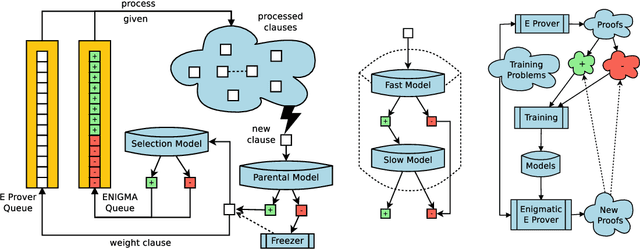Stephan Schulz
DHBW Stuttgart
MizAR 60 for Mizar 50
Mar 12, 2023



Abstract:As a present to Mizar on its 50th anniversary, we develop an AI/TP system that automatically proves about 60\% of the Mizar theorems in the hammer setting. We also automatically prove 75\% of the Mizar theorems when the automated provers are helped by using only the premises used in the human-written Mizar proofs. We describe the methods and large-scale experiments leading to these results. This includes in particular the E and Vampire provers, their ENIGMA and Deepire learning modifications, a number of learning-based premise selection methods, and the incremental loop that interleaves growing a corpus of millions of ATP proofs with training increasingly strong AI/TP systems on them. We also present a selection of Mizar problems that were proved automatically.
ProofWatch: Watchlist Guidance for Large Theories in E
May 19, 2018



Abstract:Watchlist (also hint list) is a mechanism that allows related proofs to guide a proof search for a new conjecture. This mechanism has been used with the Otter and Prover9 theorem provers, both for interactive formalizations and for human-assisted proving of open conjectures in small theories. In this work we explore the use of watchlists in large theories coming from first-order translations of large ITP libraries, aiming at improving hammer-style automation by smarter internal guidance of the ATP systems. In particular, we (i) design watchlist-based clause evaluation heuristics inside the E ATP system, and (ii) develop new proof guiding algorithms that load many previous proofs inside the ATP and focus the proof search using a dynamically updated notion of proof matching. The methods are evaluated on a large set of problems coming from the Mizar library, showing significant improvement of E's standard portfolio of strategies, and also of the previous best set of strategies invented for Mizar by evolutionary methods.
New results on rewrite-based satisfiability procedures
Jun 01, 2008



Abstract:Program analysis and verification require decision procedures to reason on theories of data structures. Many problems can be reduced to the satisfiability of sets of ground literals in theory T. If a sound and complete inference system for first-order logic is guaranteed to terminate on T-satisfiability problems, any theorem-proving strategy with that system and a fair search plan is a T-satisfiability procedure. We prove termination of a rewrite-based first-order engine on the theories of records, integer offsets, integer offsets modulo and lists. We give a modularity theorem stating sufficient conditions for termination on a combinations of theories, given termination on each. The above theories, as well as others, satisfy these conditions. We introduce several sets of benchmarks on these theories and their combinations, including both parametric synthetic benchmarks to test scalability, and real-world problems to test performances on huge sets of literals. We compare the rewrite-based theorem prover E with the validity checkers CVC and CVC Lite. Contrary to the folklore that a general-purpose prover cannot compete with reasoners with built-in theories, the experiments are overall favorable to the theorem prover, showing that not only the rewriting approach is elegant and conceptually simple, but has important practical implications.
* To appear in the ACM Transactions on Computational Logic, 49 pages
 Add to Chrome
Add to Chrome Add to Firefox
Add to Firefox Add to Edge
Add to Edge